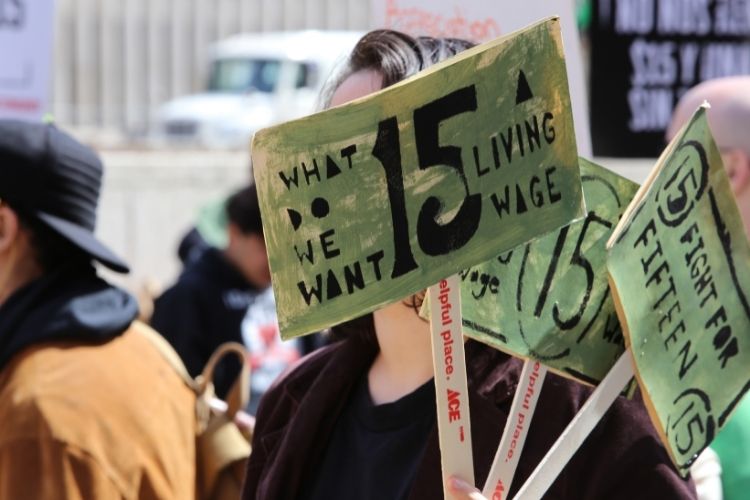Let's Talk Human Rights

Podcasts: Looking at a Living Wage in Dayton as Economic Rights
By Ahmi' Moore '24
🎙🎧Listen to Podcasts:
Interview with former Dayton City Commissioner Dean Lovelace
Interview with UD Professor Richard Stock
Suffering from the effects of the relentless pandemic beginning in 2020, the year 2021 continues to prove how crucial it is to have conversations surrounding the concept of human rights. At the University of Dayton, we value the critical study and understanding of these concepts, whether it be through one’s own research or a class’s collective study. The University started its undergraduate human rights studies program in 1998 with a minor and now offers a major and a minor in human rights.
In Spring 2021, students enrolled in Dr. Caroline Waldron’s Introduction to Human Rights (200) course - a class required of all human rights studies majors - discussed everything from the origin of human rights to the present condition of these concepts. At the end of the course, students were tasked with conducting research on Living Wage in Dayton and how it is intertwined with human rights. Students were given the opportunity to meet with experts from the University of Dayton and the Dayton City Commission Office. After concluding their research, students were asked to formulate a podcast that illustrated the data they collected.
In this blog, we highlight two of the podcast episodes from the class. The first was created by Ahmi Moore, Kinsleigh Jones, and Christianna Surratt and focuses on information obtained from Dayton’s City Commission Office about former City Commissioner Dean Lovelace’s fight for economic rights to be enacted in law in Dayton, in accordance with the Universal Declaration of Human Rights (UDHR) articles 23-25 & 27 and the United Nations Sustainable Development Goals (SDGs) 1, 3, and 8. In this episode, we underscore the idea that people are entitled to an adequate life, which requires an adequate living wage. The second podcast was created by Nathan Campbell, Elizabeth Brahler, and Brock Begesha, and showcases insights from the University’s own Professor of Economics, Richard Stock. His research informs us of the disparities between economic classes and their impact on access to education. The interview highlights how this issue could possibly be resolved by enacting a higher living wage.
Both podcasts demonstrate how the rights enshrined in the UDHR transcend the original 1948 draft and have, since then, been embedded within today’s social structure. This is exemplified in the United Nations’ recent proposal of the SDGs. The reinforcing nature of the two agendas emphasize the ways in which economic rights are human rights. As mentioned in our podcast, there is a direct correlation between UDHR articles 23-25, & 27, which establish the rights to work, join unions, rest and leisure, social security and an adequate standard of living, and to culture and scientific progress- including benefits from one’s work, and SDGs 1 on poverty reduction, 3 on health, and 8 on decent work. Following the correlation between the two agendas enables us to gain a more critical understanding of how economic disparities are just as much a human rights issue as disparities in gender or other areas.
Please enjoy our podcasts for an in-depth overview of how economic rights are human rights and what that means in a place like Dayton, Ohio.
🎙🎧LISTEN TO PODCAST
Interview with former Dayton City Commissioner Dean Lovelace
Interview with UD Professor Richard Stock
Ahmi’ Moore is a sophomore human rights studies and English major from Xenia, Ohio. As an Abolition Ohio intern at the HRC, Ahmi' focuses on furthering anti-trafficking efforts through education, advocacy, awareness-raising, and research.
Podcast Creators in Human Rights 200 "Introduction to Human Rights" class:
Kinsleigh Jones, Ahmi Moore, Christianna Surratt, Nathan Campbell, Elizabeth Brahler, and Brock Begesha
Dr. Caroline Waldron is an Associate Professor of History at UD and Faculty Research Fellow with the HRC. During the academic year of 2015-16, she served as the Special Advisor to the Provost on Gender and Equity. She was the first person to hold this important position at the University of Dayton.
